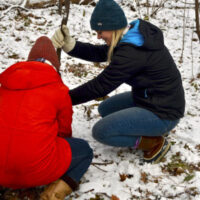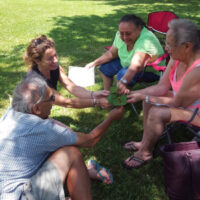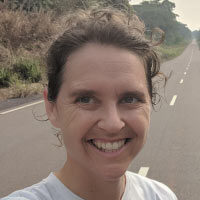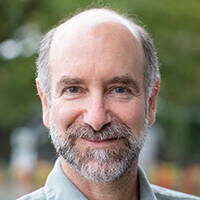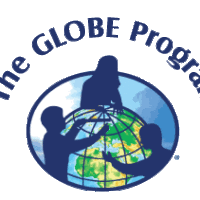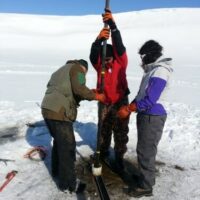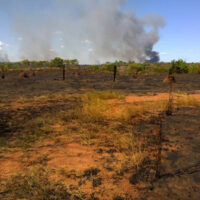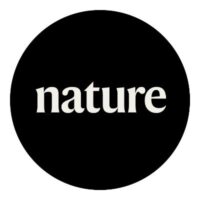
Nelson Institute announces endowment for Professor Clarence “Clay” Schoenfeld Scholarship Environmental Education Fund
The Nelson Institute for Environmental Studies is honored to announce a new $30,000 endowment from donor George R. Affeldt in support of the Professor Clarence “Clay” Schoenfeld Scholarship Environmental Education Fund. The gift will support …

Conaway connects with Tribal communities on environmental challenges
For Nelson Institute faculty associate, Jessie Conaway helping people to connect with and protect the natural world has been a lifelong goal. As a career outdoor educator, Conaway has spent both her personal and professional …

Alumna at the forefront of wildlife-transmitted disease research
From understanding the viral spillover risk of diseases like coronavirus to research on the health of great apes, Nelson Institute alumna Sarah H. Olson is at the forefront of some of today’s most pressing environmental …

Jonathan Patz receives WARF named professorship
He is among eight faculty who received the 2021-22 awards that honor those who have made major contributions to the advancement of knowledge, primarily through their research endeavors, but also as a result of their teaching and service activities.

GLOBE Midwest ESS Collaborative hosts virtual science symposium
On May 13, 2021, the Midwest GLOBE (Global Learning and Observations to Benefit the Environment) / ESS (Earth System Science) Collaborative hosted the GLOBE Midwest ESS virtual Science Symposium, with 25 student groups from 11 …

Edwards finds that repairs to natural gas distribution system don’t always work
For the network of pipelines that bring natural gas to homes throughout the United States, leaks are an ongoing challenge. Repairing those leaks can lead to safety and climate benefits by reducing the amount of methane (a potent greenhouse gas) released into the atmosphere.

Nelson affiliate Jim Kossin’s research shows that hurricanes are getting stronger
Nelson Institute Center for Climatic Research (CCR) affiliate Jim Kossin, recently shared his research into the connection between climate change and hurricanes with the New York Times and NBC Miami. Kossin’s research shows that over …

Earth’s vegetation is changing faster today than it has over the last 18,000 years
The research suggests that humanity’s dominant influence on ecosystems that is so visible today has its origin in the earliest civilizations and the rise of agriculture, deforestation and other ways our species has influenced the landscape.

Holly Gibbs receives 2021 GHI Seed Grant
Nelson Institute for Environmental Studies and Department of Geography associate professor, Holly Gibbs will receive support for her research from two 2021 University of Wisconsin-Madison Global Health Institute (GHI) Seed Grants. Her research titled, “Health, …

Environmental Conservation alumnus brings natural climate solutions to the forefront of the climate change discussion
Sharing the benefits of natural climate solutions is at the heart of Nelson Institute alumnus Nathan Henry’s work, but it wasn’t long ago that he had an entirely different career. For most of his career, …

Manantlán Biosphere Reserve supported by UW-Madison highlighted in Nature
Nelson Institute adjunct professor and Department of Forest and Wildlife Ecology alumnus, Eduardo Santana Castellón recently co-authored a letter to the editor titled, Value of Mexican Nature Reserve is More than Monetary in the journal …

Nelson Institute affiliate to co-host virtual book launch on May 18
Join Nelson Institute affiliate, executive director of the Human Rights Program, and director of Research Centers at the University of Wisconsin Law School, Sumudu Anopama Atapattu on May 18 at 11 a.m. CDT for the …

Wisconsin teachers connect human and planetary health in new lessons for students
A dozen Wisconsin K-12 teachers went back to school for the last year to learn more about the connections between the health of humans and the health of the planet. The K-12 teachers from Madison, …

